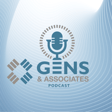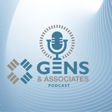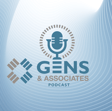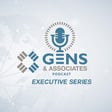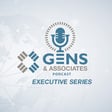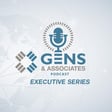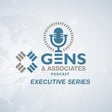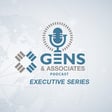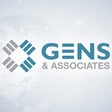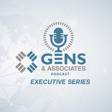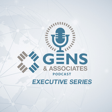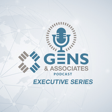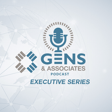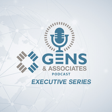Become a Creator today!Start creating today - Share your story with the world!
Start for free
00:00:00
00:00:01

Episode #22 - The pursuit of establishing data standards across Regulatory
Welcome to The Gens & Associates Podcast, where key members of the consulting firm will discuss insights into their research, regulatory trends and hot topics, as well as converse with industry thought leaders.
In this episode, Katherine Yang-Iott asks Brooke Casselberry to share her thoughts on the progress of regulators working collectively with life science organizations to establish data standards across industry, including the ICH M4Q(r2) and other reliance programs.
Transcript
Introduction and Guest Welcome
00:00:00
Speaker
Hi, everyone, and welcome to the Guns and Associates podcast. I'm your host, Katherine Young Ayat, consultant and analyst with Guns and Associates. In this episode, my guest, Brooke Castleberry from Apista Life Sciences, is here to share her expertise on the ICH M4QR2.
00:00:17
Speaker
Brooke, welcome to the Gens and Associates podcast. I'm thrilled to have you on as a first time guest. I have to say that as much as I love talking to the members of my own amazing team on this podcast, we've been really expanding and growing, welcoming new, smart, and really great guests on the latest episodes that we have. So again, I'm so happy to have you join.
Brooke's Experience in Life Sciences
00:00:38
Speaker
Please tell our audience a little bit about who you are and the kind of work that you're involved in within life sciences.
00:00:44
Speaker
Yeah, thank you for having me, Catherine. And I'm a big fan of Gans and Associates and Steve and all the great work that's been happening over the last couple of decades to really keep our industry informed.
00:00:55
Speaker
with the surveys and and all of the information that comes across you know from multiple perspectives. So I'm honored to be here. So yeah, Brooke Hasselberry, I've been working in life sciences industry for almost 25 years now, primarily on the consulting services side. That also includes working with vendors, working with sponsors, and working in areas of regulatory intelligence, regulatory operations, and and primary and and primarily in regulatory space. For the last,
00:01:26
Speaker
seven years or so I've been working more in kind of business development and partnership with Tony and our, and our, and our PISTA team. And, um, we're happy to,
What is the ICH M4QR2 and Why is it Important?
00:01:37
Speaker
happy to be here. Um, from a regulatory intelligence perspective, I'm very, very excited to talk about this topic of ICH and the ICH initiatives that are coming to approval here pretty soon. Um, and the impacts that they can have on our industry.
00:01:51
Speaker
Yeah. Sounds to me like you're doing lots of work and you are an all around expert. So, you know, happy to have you here. um So you are here to share with us the latest thinking and the updates about the ICH M4QR2, which is basically updating something that was first developed and introduced, what, like 20 years ago, right? The R1 was in 2002. You know, just um to preface this conversation, my depth of knowledge on this topic is very shallow.
00:02:16
Speaker
um But basically, the M4Q is the quality section of the CTD that provides that harmonized structure and the format for the CMC information in a registration dossier. Since you're an expert in this area, and I know you've been speaking about this topic recently, and I think i think you talked about this at the DIA, I'm pretty sure, right? um Say more about the ICHM4RQ, the M11. More importantly, why should our listeners care? Why is this topic important to industry?
00:02:41
Speaker
Yeah, so I want to just preface this that most of what I'm saying here are my observations and my opinions on how this is all coming together across the industry.
Industry Progress and Standard Harmonization
00:02:51
Speaker
And I appreciate the reference as an expert, but there are definitely some people who are deeply, deeply involved in each one of these initiatives going from the FDA and sponsor organizations and um who have been you know deeply involved in getting the comments together and responding to the comments and such. so So yes, we did present on this at DIA. I had a very great panel of team members that that have been deeply involved with pulling this together and and getting it to um you know something that's ah an applicable initiative. um But it's really, what's important about it is you know in our industry, especially in regulatory operations, but in the operations side um of life sciences, you know we've kind of been operating in this status quo for about the last you know two decades, almost almost three really.
00:03:34
Speaker
And that status quo has really been based off of the the structure of ECTV and Common Technical Document. The Common Technical Document, if you recall, is, you know, was defined by ICHM4. There hasn't been a whole lot of changes and initiatives that, you know, have really taken hold to progress us into something that's keeping up with the times considering, you know, we're now in 2024. So over we the last 20 years or such, we haven't had a whole lot of progress made.
00:04:01
Speaker
And so what ICH and what the, you know, the team members and the individuals and the consortiums that have come together that have been really been working on this, both within, you know, from the regulatory perspective for ICH itself, which is just to back up on that is the International Council on Harmonization.
Advancing Regulatory Data Systems
00:04:16
Speaker
So it's based off of, you know, developing, you know, harmonized efforts from a regulator's perspective, and it is, you know, formed by regulators and its regulators that are at the table.
00:04:27
Speaker
for that, but then there's also collaboration with a lot of industry members and industry consortiums that can come in with pharma and and others. So there's this really, this movement that has been taking place to try to enhance the standards that go through ECTD so that we could get to a place that we're not just dealing with PDFs, locking up all of our data and PDFs, extrapolating them once it gets to the FDA or EMA or any other health authority And then doing an analysis on them only to still go back to working in, um, in PDFs and pretty restricted environments when it comes to data and metadata that's associated to it. Um, so I'll pause there for a second and see did I, if I answered your question on kind of setting that, and then I can continue on and how it relates to and the wider ECTD and additional life sciences areas. Yeah. No, I was, I was actually gonna, that's my next question for you, but oh you're right. It has been going on for a long time, right? Like the progress has been very slow.
00:05:22
Speaker
you know one of the things that we found in our research for the world-class room, which is a you know industry benchmark that we produced every two years um looking at the regulatory landscape, we found that there's a slow pace of change for a lot of um governing bodies and health authority requirements, which really complicates the adoption of data standards. right And then maybe you'll we'll kind of talk about this a little bit later, but do you see that starting to speed up a little bit more? um You sound very optimistic that you know things are moving in the right direction,
00:05:52
Speaker
you know, 30 years of ah of this is starting to come to some sort of fruition, right? Yeah. Well, I mean, it's, you know, we've been working towards this for a long time. You know, you know, for me, it's been, you know, really kind of starting with the, you know, IDMP. I just want to say for everyone who's spent all their time that has done IDMP and has been working on that as a data standard.
00:06:13
Speaker
and has done their assessments, please don't fret. That work was not four is not lost because all of these initiatives that are moving forward with ICH and with ICMRA and with you know PQ, KMS, they all have that underlying IDMP as a foundational data standard. So just to throw that out there for the audience that's listening. so you don't you I would say if Kelly was here, she would appreciate that. I remember that day when she was like, I'm going to start drinking. and But you know i feel like you know, if you go to a basketball game, you know, sometimes you watch and there's, you know, 20 shots on on on the hoop and you watch and you watch and you watch and you're like statistically, one of those is going to go in. Right. And I kind of think we're kind of in that position here to like statistically, you know, we keep pushing forward. And I think, you know, it's fair to say that there's a lot of people that are wanting to see
00:07:01
Speaker
these, you know, these initiatives and these harmonizations come be together. But there are limitations, there are gaps, and there's things that, you know, I think we there is going to be, you know, accountability on us as we continue forward with our, you know, our our careers and what we're trying to establish to, you know, keep helping to close those gaps. And, you know, and one of those is really, you know, we can put a forward all of the data standards that we want. We can come forward with all of these different harmonized efforts. But if there's not adoption,
00:07:29
Speaker
that they're just going to continue to not go anywhere. And that adoption has to be global, um you know, and across the regulators and across the corporations that are dealing with data. So, you know, we start start start off here talking about ICH and And 4QR2 is important because it applies to module three in your ECTD structure for your CMC content and quality content.
00:07:52
Speaker
which also leads to your module two summary information. Because, of course, module two is the summaries of module two three, module four, module five, module five being clinical data. M11 is important because M11 is also setting the harmonized protocol template for formatting, structuring, numbering, all of the information that goes into your protocols. um And those protocols that go to the health authorities and also go into clinical trials and have an input back into the clinical trials and studies, those have an, again, a global the global impact and global influence for product development and identifying new products and you know a new you know new patient populations and all of this information. And M11, of course, is for M5, and then module five, and then other summaries in module two. so So each one of these gets us to a place where we can really capitalize you know both from and you know life sciences and patient population, but also on a business
00:08:49
Speaker
scalability aspect on those data elements, right? And being able to analyze them and um utilize them in a way that, you know, fits with the latest technologies. And right now we don't have that capability. So just kind of backing up there for a second. So as we go forward with each of these, if we establish the data standards and then we have a different adoption within organizations and a different adoption within the health authorities on a global scale, it's going to continue to limit our factors. Yeah, it's a partnership, right? He needs to come from both. Yeah, I agree. ah so So what I would say with it on our part from the industry perspective on what we can do to help kind of push these things forward so that we can see a real adoption of ICH, of IDMP, of the you know ISO standards, and also kind of normative exchanges on how we're getting that information across, whether it be through real rights programs or different solutions that are out there. is, you know, there's a lot of areas that we can get involved in. ah You know, be it, you know, through there's the ISP program, there is the pharma program for pharmaceutical organizations that they can be at the table at. But what's really critical is being at the table where decisions are being made, and then influencing those changes within the environments that we exist in.
00:10:08
Speaker
Yeah, I mean, you you're speaking about a couple of projects and it would be great to know where if people out there who are listening who are interested in some of these projects and how they can be involved to and to know where they can sort of
What are Reliance Programs?
00:10:18
Speaker
tap in our access to these resources. But are there other initiatives that you see being impacted by the adoption of data standards and, um you know, as they relate to ECDD and regulatory operations?
00:10:29
Speaker
Um, yeah, of course there is, you know, I've just, you know, just briefly touched on reliance. Reliance programs are important. Um, reliance programs have been around for quite some time that, you know, it's project Orvis that's access, you know, that's a lot of the initiatives that we are hearing at at conferences, um, and different entities. Now, if you're, if you're out and about, um, I don't want to talk about any necessarily solutioning as as a part of this, but, um, reliance has been around for quite some time and reliance has that capability of having a centralized location to be able to have a collaborative review of your content. And a collaborative review of the content, whether it be for your CMC content, your clinical content, your non-clinical, whether it might extend data sets and such. um Having that centralized location allows for health authorities to see what health authorities are already saying, which then
00:11:26
Speaker
alleviates the laborious tasks for the sponsors on answering those questions five, 10, 15, 50 different times, depending on where they're submitting their product. And that is massive because if we can get that type of, you know, reliance programs adopted, then think how much faster products can get to market on a global scale. And then also the reduced cost and ah need for resources within the organizations to get those products developed. that's There is a big impact on that, and that is, do we have standards to be able to make Reliance make sense? So if we're talking to five different health authorities and we're using one data element, will they all understand what that data element actually means? Yeah. And it seems you know like the
00:12:18
Speaker
There's a common goal here that can be easily rallied around, right? Everybody wants this. And so maybe my last question for you is looking a little bit into the future, right? Kind of wrapping this conversation up. But here, here at Gens and Associates, we've been giving a lot of private debriefs to companies about their outcomes from the recent world classroom survey. And one of the things that we track is how companies are progressing in the regulatory space and you know where and how they're thinking about investing in the future. And you know what we're seeing is that industry is just coming out of this big modernization cycle in terms of room. And we are seeing them heading into this new era of maturing their digital strategy and their transformation journey for
00:12:53
Speaker
you know, for regulatory
Future of Regulatory Affairs: Embracing Digital Transformation
00:12:55
Speaker
organizations. So my question for you is, you know, what is your opinion on the changing regulatory landscape and what sort of progress, not just possibilities, but actual application or practicalities adoption, right? Like what you were just talking about. Do you think that we'll see in the next five years? And obviously I'm asking you in in the context of, you know, the ICH, the M4, QR2 progress and the possibilities that it can enable or unlock. um Yeah. um It's interesting that, you know, the sentence, you know, rim, you know, coming out of the modernization area and rim being the modernization area, um which speaks volumes of of where we're at, you know, and what I said at the beginning of this podcast. um ah So, yeah, I think, you know, what I'm seeing is, is, you know, we're we're certainly seeing a lot of, we're seeing a lot of exploration in
00:13:46
Speaker
ah digital AI or generative AI and the applicability of that within organizations, you know, for data, data capture, data management and um and different analytics and and such. We also, there's some sponsoring companies that won't even address the topic of AI. it's It's an absolute no-go, which I think is really interesting, you know, those are early adopters and those kind of ones that are waiting to see how this plays out and and how that works. But what we're also seeing a lot of right now is a lot of mergers and acquisitions.
00:14:16
Speaker
You know, and I kind of, I think I did a presentation, you know, just last year saying, I think there's going to be a lot of mergers and acquisitions next year with everybody kind of tightening their belts and they're they're spending and such. So, and here we are. And it's happening. It's happening through acquisitions of products, acquisitions of organizations. And then, you know, with the latest.
00:14:35
Speaker
Um, kind of shut down that we had just last week with the Microsoft, um, was that counselors, you know, that had a pretty big impact. And what, you know, the re the results of these things that are happening is when you're taking an environment that exists outside of your environment that has their own.
00:14:50
Speaker
their own ways of operating their own processes, their own individuals, their own you know legacy, intellectual knowledge that has been within those organizations. And then you're bringing them in and merging them into your organization, whether it be you know as a whole department or is it being just the products themselves and how those products have been captured and managed and organized and how the clinical studies have been managed and organized and what CROs are involved in, managed and organized. And you're bringing that in a lot of organizations that are trying to grow through that non-organic kind of stage.
00:15:21
Speaker
is there's a lot of struggles that's happening with it. And so it almost it almost becomes where digital transformation is not in a place where it's an an option an option or a nice to have. It's really getting to a place where it's becoming a necessity and it's a necessity of growth and a necessity of staying on top of the game if that's what your goal is. Yeah. Yes.
00:15:46
Speaker
Um, you know, it feels like there's so much more that you could talk to our audience about this and we can continue, but I'm going to be a stickler for making sure that, you know, all of our episodes are perfectly bite size, right? We want to give a little food for thought. Um, so, you know, thank you for all of your thoughts. I think this is great food for thought. And I want to kind of close out.
00:16:06
Speaker
this conversation by inviting our listeners to connect with you directly if they like. um you know Before I announce how they can do that, you know Brooke, do you have any closing comments or thoughts you'd like to share? Yeah.
The Importance of Data Standards in Life Sciences
00:16:18
Speaker
i just Like I said, I really appreciate appreciate being here. you know I think what would be fantastic and I know your plans on your on your podcast in the future, but there's so much that can dive into each one of these on an individual level. um and Then you know really that ability to connect the dots on why all of these data standards are really related to each other. um And sometimes I think that gets missed. So I'm happy to have this conversation and continue the conversation and you know meet with anybody who is interested. But yeah, it's an honor to be here. Thank you, guys.
00:16:49
Speaker
Yeah, thank you so much for being on with me. I mean, we you know we do poll surveys throughout the year, and this might be a topic that's something we can continue talking about, to see if you know this is a learning ah learning opportunity for our research community. um But great, you know thank you again for being here. I really do hope you come back and we can talk about each of these things individually or you know about something completely different. um Listeners, if you've heard something today that makes you want to explore more on this topic, you can connect directly with Brooke.
00:17:17
Speaker
heart contact information is included on the Gens and Associates podcast information page that's for this episode. You can also reach out to me if you like. um Until next time, cheers.
